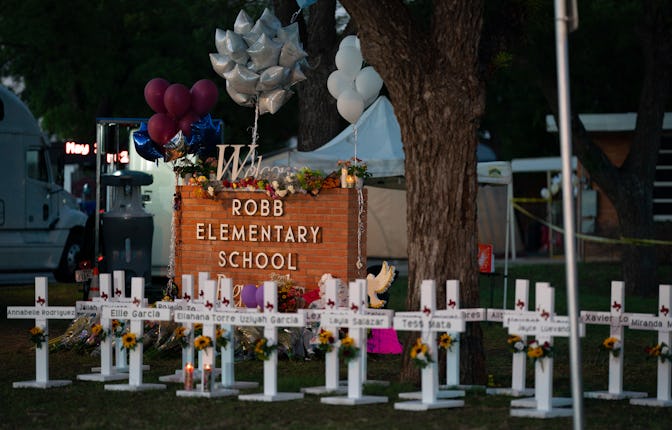Demolishing Robb Elementary School is a good idea. Just not yet.
We can’t trust the same officials who bungled the response to evaluate whether all the evidence has been gathered.

“The school will be demolished,” Mayor Don McLaughlin (R) of Uvalde, Texas, told city counselors during a contentious meeting Tuesday night, as his city continues to grapple with last month’s mass shooting at Robb Elementary School. “You can never ask a child to go back, or teacher to go back, in that school ever.”
McLaughlin’s plan, which he confirmed he’d discussed with the school district superintendent, is understandable; other mass shooting sites have been similarly razed or retrofitted in service of communal healing. In the case of Uvalde, however, the promise to demolish the site where 19 children were gunned down in their classroom comes amidst a struggle to even identify — much less inform the public of — why a contingent of heavily armed law enforcement officers seemingly chose to stand idly by while the shooting took place. Indeed, each new revelation about how police did and didn’t act that day seems to raise more horrifying questions than before, pointing at not only a massive cascading failure during the shooting itself, but a slapdash effort to cover up and shirk responsibility for what went wrong.
In this context of open-ended questions and officials showing not only a willingness, but indeed an eagerness to transparently flout their responsibilities, it seems reasonable to say that, yes, the school building should absolutely be razed — but — as an active crime scene in a community still reeling from the tragedy and revelations surrounding it, the decision of when and how to destroy the site of a monumental law enforcement catastrophe should not be left in the hands of the same officials complicit in that catastrophe.
As Tuesday’s council meeting proved, in fact, there is already a schism growing between the city’s politicians, who are anxious at what they claim is an effort to scapegoat their local police by state agencies, and those Texas-level entities. Speaking to Texas Department of Public Safety Director Steve McGraw’s allegations earlier Tuesday that Uvalde police had stood outside an unlocked door for over an hour, rather than attempt to enter the classroom where children were being killed, McLaughlin claimed that McGraw was inclined to “lie, leak, or misstate information” in public as part of an “agenda” to focus blame on the Uvalde police response.
Concurrently, McLaughlin and the rest of the Uvalde City Council voted to deny newly installed councilmember — and Uvalde Independent School District Police Chief — Pete Arredondo’s request to be absent from future council meetings. Arredondo has been the focus of much of the criticism regarding the city’s response to the shooting, with McGraw claiming during his Tuesday testimony that “the only thing stopping all dedicated officers from entering rooms 111 and 112” during the shooting was Arredondo himself.
The city council’s decision not to allow Arredondo to take leave of future meetings (if he misses more than three without authorization, the council can vote to remove him entirely) was met with cheers from Uvalde residents, including shooting victim Uziyah Garcia’s uncle, Brett Cross. “Having Pete [Arredondo] still employed, knowing he is incapable of decision-making that saves lives, is terrifying,” Cross told ABC News, adding that “innocence doesn’t hide, innocence doesn’t change its story, but innocence did die on May 24.”
Given these criss-crossing vectors of mistrust and animosity, and the continually shifting narrative around what police did — and crucially didn’t do — during the shooting, it’s easy to understand the inclination to destroy the Robb Elementary School building. This is a community in need of healing. But healing can only come with transparency — and until Uvalde gets that, razing a building that may still hold answers about what happened on May 24 isn’t going to help anyone.